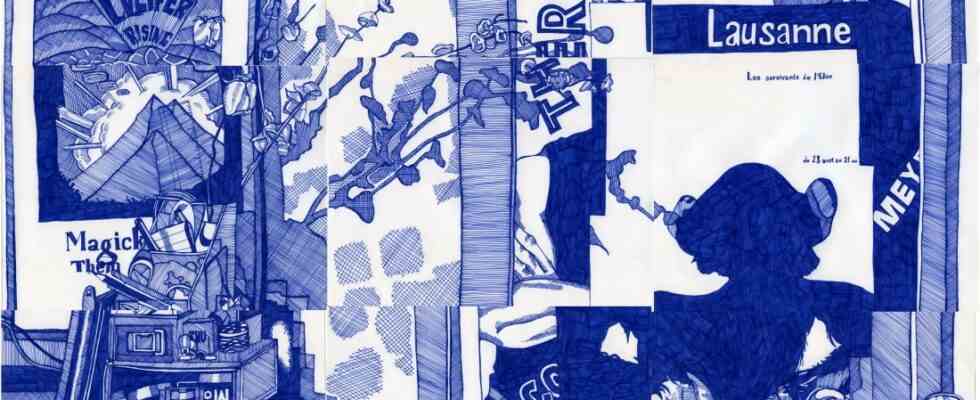Keren Cytter has written and illustrated three picture books. One of them is called “The Curious Squirrel” (2015). The eponymous “curious squirrel” (curious can also mean “strange”) is supposed to buy milk for his parents. But the two euros that the father gives the squirrel are talked into being talked into a begging rabbit. What follows is an urban odyssey with all sorts of sinister encounters. Among other things, the squirrel meets a drug-dealing goose, who asks if it’s so sad “because your breasts are so small and your tail is so overdeveloped”? In the end, the protagonist returns home without milk, but having learned an important lesson: “I must choose my own path and accept it when I stumble, because the road and its destination are one and the same.”
To describe “The Curious Squirrel” as exemplary for the work of the Israeli-born artist would be just as justified as it would be short-sighted. The deliberately amateurish illustrations, the quasi-autobiographical mixture of children’s and adult themes, the semi-ironic, Zen-like morality at the end – it’s all quite programmatic. But as it turns out when visiting “Bad Words”, an ambitious overview of Cytter’s exhibition in Aachen’s Ludwig Forum, the 44-year-old’s oeuvre cannot be reduced to one genre, one work or one style.
In Karen Cytter’s works, analogue and virtual communication flow into one another
Keren Cytter is usually apostrophized as a video artist. She studied in Tel Aviv and Amsterdam, lived in Berlin from 2005 to 2012, since then she has been at home in New York. She became known through films; some of her video works were shown at the Venice Biennale 13 years ago. The title of the exhibition itself is borrowed from a video work from 2021. But Cytter has also created performances, plays, sculptures, drawings, photo series, written novels, life coaching and children’s books.
She operates a tremendously multifaceted self mining and at the same time explores human interaction in a technology-obsessed era in which virtual and analogue communication are increasingly merging, driven by the need for permanent presence in the lives of others. It seems very appropriate that this artist, who doesn’t so much transcend the boundaries of all genres as light-footedly jumping over and over, now gets such a big performance in Aachen of all places – in a border area, not far from the art-loving Maastricht in the Netherlands. Works that have been created over the past 20 years can be seen.
“Bad Words”: The worlds of children and adults meet.
(Photo: Mareike Tocha/Keren Cytter)
The performance is undoubtedly large: curator Eva Birkenstock, who has moved from the Düsseldorfer Kunstverein to Aachen as director, seized the opportunity to fill the entire Ludwig Forum, from the ground floor to the second floor of what was formerly the largest umbrella factory in Europe, the upper rooms of which are more than had remained unused for a decade. Opened with the “Cold Summer” festival, where fellow artists read, gave music and performances, “Bad Words” transfers the momentum of performative art into a static show.
The connecting element is a single, huge sentence that stretches across the walls and floor from the first to the last room in English and German. Attempting to read it will necessarily fail. But individual sections of meaning correspond again and again with the stations of the show. This begins with a birth description in the first gallery, where the children’s books, their animated adaptations on screens and children’s furniture are on display, and ends with an abstract, recent gold pen drawing entitled “Bedside Lamp”.
Some works come across as decidedly amateurish – but that’s part of the overall concept
At first glance, the show seems to make it a principle that the visitor is overwhelmed by the abundance of material. The video works alone would require a separate visit if one wanted to study them in detail. Even “Four Seasons” (2009), which can be seen in Room 2 and follows a dream logic, in which a woman finds her neighbor bleeding in the bathtub, is so stuffed with film-historical associations from “A Streetcar Named Desire” to “The Tenant” that worth looking at several times. The numerous books that are on display throughout the exhibition – including the selections “The Best” and “The Worst of Keren Cytter” – can at best be subjected to cursory reading.
From Israel via Berlin to New York: the artist Keren Cytter.
(Photo: Albrecht Fuchs)
But the themes that come up again and again – the transition from one phase of life to the next, the retranslation of the digital into the tangible (Cytter consistently calls abstract self-portraits “selfies”) and again and again the cooperation with friends and colleagues – make it easier, in a kind of receptive to stay flow. Among other things, the focus is always on depicting the artist’s immediate surroundings: This ranges from colored pencil drawings of Internet stills to the finely hatched depictions of her New York apartment distributed on individual sheets put together to occasional “doodles” and drawings of banknotes , which can be understood as a commentary on the art market as well as a pure exercise in representational representation.
Venturing into all genres inevitably leads to mixed results. Thus, the stacked epoxy resin casts of hands and forearms that Cytter created with her American friend and colleague John Roebas and that are collected in Aachen under the title “Body Egos” are a rather crude, deconstructive play on sculptural traditions. The objects made of pearls and chicken bones, which oscillate between jewelry and shaman fetishes, also have something decidedly amateurish about them.
But the technical inconsistency is part of the overall concept in this case, right down to Instagram-compatible snaps of Cytter’s various cats. Because although she very rarely shows herself in her work, “Bad Words” is ultimately above all an expression of this highly productive artist’s intense self-reflection – an expansive, associative selfie.
Keren CytterBad Words. Ludwig Forum for International Art, Aachen. Until September 25th.

